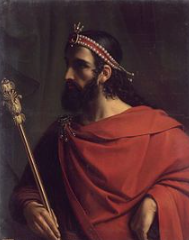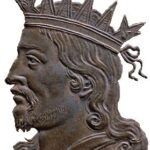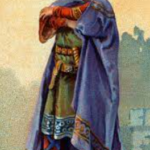
Date of Birth
1 February 0517
Place of Birth
Reims, Marne, Grand Est, France
Towns / Cities Moved Into
Reims, Marne, Grand Est, France |
Soissons, Aisne, Hauts-de-France, France |
Empiré, Maine-et-Loire, Pays de la Loire, France
Known Occupation
Merovingian King of Paris (King of the Franks at Paris)
Religion
-
Spouse
Death Information
Year of death
Dec 567
Place of death
Empiré, Maine-et-Loire, Pays de la Loire, France
Cause of death
-
Burial location
Saint-Germain-des-Prés Church in Paris, City of Paris, Île-de-France, France
Obituary

Parents

Clotaire I Meroving

Ingonde von Thuringia
Marital Status


Married Queen Ingoberge De París
Siblings





Children






Narrative / Story
In the annals of early medieval history, the figure of Charibert I stands out as a pivotal character in the Merovingian dynasty. Born on the 1st of February, 517, in the ancient city of Reims, Marne, Grand Est, France, his life was set against the backdrop of a rapidly evolving socio-political landscape. As the eldest son of Chlotar I and Ingund, Charibert was born into a world where lineage and power were intertwined, and his early years were shaped by the grandeur and complexities of his noble birth.
Charibert’s upbringing in Reims, a city with a rich Roman and Frankish heritage, was a preparation for his future role as a ruler. The Merovingian kingdom, a melting pot of Roman and Germanic cultures, was in a state of flux, marked by power struggles and territorial expansions. As a scion of the royal family, Charibert was educated in the arts of statecraft and warfare, essential skills for a future king in a time of great change.
Upon the death of his father in 561, Charibert ascended to power, inheriting the old kingdom of Childebert I, with Paris as its capital. This inheritance marked the beginning of his reign as the Merovingian King of Paris. His rule was characterized by his eloquence and knowledge of the law, traits that distinguished him among his contemporaries. However, his personal life was marked by controversy, particularly in his marital affairs. Charibert’s marriage to Ingoberga around 558 in Soissons, Aisne, Hauts-de-France, France, was the start of a complex marital history. He maintained four concurrent wives, including two sisters, leading to his excommunication by Germanus. This scandalous behavior was not only a personal failing but also a reflection of the turbulent and often morally ambiguous nature of Merovingian politics.
Charibert’s family life was equally intricate. He fathered several children, including Blithide of Cologne, Chrodobertus, Bertha, Queen Consort of Kent, Charibert de Haspengau, Berteflede, and Clothilde. His daughter Bertha’s marriage to King Aethelberht of Kent was a significant political alliance, influencing the spread of Christianity in England. Charibert’s other children, born to his concubines Merofleda, Marcovefa, and Theodogilda, further complicated his familial and political dynamics.
Throughout his reign, Charibert faced various challenges, including defending his kingdom against the Avars, a fierce nomadic tribe. His military campaigns and strategic decisions were crucial in maintaining the stability and integrity of his realm. The socio-economic issues of his time, such as the constant threat of invasion and the need for strong leadership, were ever-present in his rule.
Charibert’s death in December 567 in Empiré, Maine-et-Loire, Pays de la Loire, France, marked the end of an era. His burial in Saint-Germain-des-Prés Church in Paris was a testament to his status, despite his excommunication. The division of his kingdom among his brothers Guntram, Sigebert I, and Chilperic I after his death signified the ongoing fragmentation and power struggles within the Merovingian dynasty.
Reflecting on Charibert I’s life offers a glimpse into the complexities of early medieval European royalty. His story is one of power, controversy, and the interplay of personal and political ambitions in a time of great change. His legacy, though marred by personal failings, remains a significant chapter in the history of the Frankish kingdom and the broader narrative of medieval Europe.
Charibert’s reign was not just about personal and political intrigues; it was also a time of significant military and diplomatic activities. His involvement in various military campaigns, including the defense against the Avars, showcased his capabilities as a leader and a warrior. These military endeavors were not only about protecting his kingdom but also about asserting his authority and maintaining the balance of power within the Frankish territories.
The socio-economic landscape of Charibert’s time was marked by the transition from the Roman to the early medieval period. This era saw the gradual decline of Roman influence and the rise of Germanic kingdoms, including the Merovingian dynasty. The people of this time faced numerous challenges, including political instability, economic upheavals, and the threat of invasions. As a king, Charibert had to navigate these challenges while maintaining the prosperity and stability of his kingdom.
Charibert’s life also intersected with significant religious developments. His excommunication, a rare event for a Merovingian king, highlighted the growing influence of the Church in secular affairs. This period saw the Church consolidating its power and playing an increasingly prominent role in the governance of the Frankish kingdoms. Charibert’s interactions with the Church, both positive and negative, were indicative of the complex relationship between the secular and religious authorities during this time.
In conclusion, the life of Charibert I, King of Paris, is a fascinating study of a ruler navigating the turbulent waters of early medieval Europe. His reign was marked by political intrigue, familial complexities, military campaigns, and religious controversies. His legacy, though overshadowed by his personal failings, provides valuable insights into the Merovingian era, a period that laid the foundations for the future development of Europe. Charibert’s story is a testament to the enduring nature of power, ambition, and the human spirit in the face of the ever-changing tides of history.






